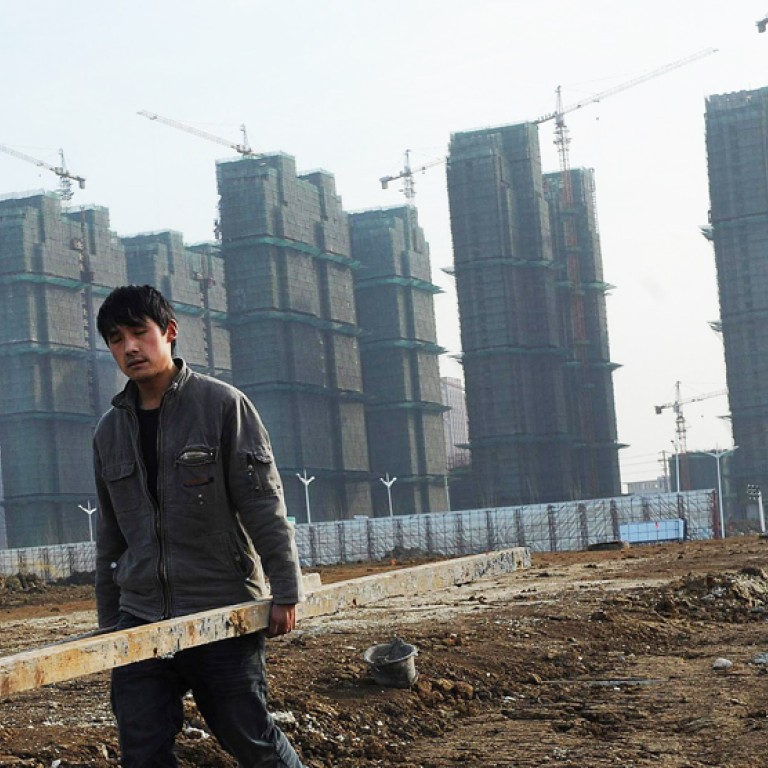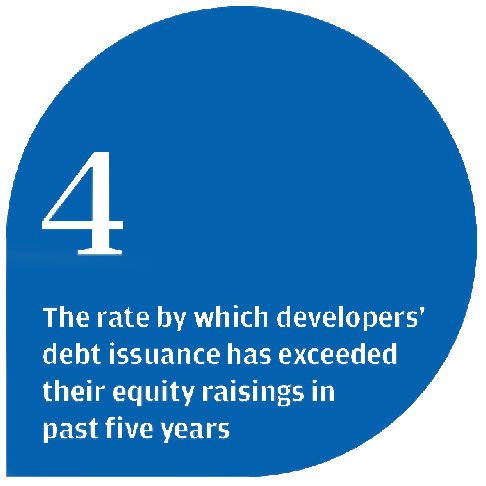
Equity-averse developers in a bind
With bond market spooked by the first default, mainland property firms may have to overcome resistance to tapping share market for funds
Bond issuance by mainland developers has been in hiatus since last month's default of Zhejiang Xingrun Real Estate on 3.5 billion yuan (HK$4.4 billion) of domestic bank loans and other debt.

"Every time the market window seems to be open there is a lot of supply [of mainland real estate bonds]. Investors are becoming wary," said Henry Wong, a banker who covers the property sector for UBS.
Meanwhile, interest rates are rising and property markets are softening, and mainland regulators have cut off property firms' access to trust loans, previously an important source of capital for the sector.
It would appear to be time for developers to raise equity capital. This would cut their refinancing risk, give them cash for expansion, diversify their investor base and rebalance their capital structures, reassuring a skittish market. But, as sensible as all that sounds, analysts and bankers say the heads of mainland property firms will resist selling shares until their last breath.
"These companies think quite highly of themselves. They think their shares are undervalued," said Bei Fu, a mainland property analyst for Standard & Poor's.
Nathan McMurtray, head of Asian convertible bond origination at Deutsche Bank, said mainland developers were remembering when their share prices were really high - in 2006 and 2007. "They say, I know my projects are worth more than what the equity markets are implying, based on where the share price currently is," he said.

The data speaks for itself. Over the past five years, mainland property firms have issued four times as much debt as equity, according to Thomson Reuters.
Excluding funds from initial public offerings, property firms have issued about 10 times more debt than equity in the same period. The skew towards debt became more pronounced after 2010, as low interest rates and falling share prices pushed issuers to the offshore bond market (see graph).
There is some truth to the view that the sector's shares are undervalued. Mainland property giant Guangzhou R&F Properties, for example, trades at a price-earnings ratio of 3.8 times current earnings. That implies low growth, but the firm's profit has increased at a compounded annual rate of 21 per cent over the past five years.
Evergrande, another stalwart of the sector, trades at 3.9 times earnings despite a 66 per cent compounded annual rise in profit over the past five years.
Somewhat ironically, given companies' misgivings about equity issuance, investors have been discounting property stocks over concerns they are over leveraged. They worry that developers will find it difficult to refinance debt if their market veers into one of its occasional deep cyclical downturns.
"The higher the gearing ratio, the higher the risk, and the lower the [share] price should be," James White, a senior analyst at Colonial First State Global Asset Management, said of the mainland developers.
While the relationship is not perfect, the issuers with the highest debt-to-equity ratios tend to have the lowest price-earnings multiples, with the most heavily geared firms trading below four times current earnings (see graph).
White said shareholders were also concerned that the property firms would eventually be forced to issue a lot of equity, which would dilute their stakes.
So the developers are caught in a negative feedback loop. The greater their gearing, the lower their share price; the less inclined they are to sell shares, the greater their gearing.
If mainland developers do eventually sell equity, it may be because they find themselves frozen out of markets, and the opportunity cost of forgoing projects is too high.
The firms used all the cheap debt capital of recent years to buy land, resulting in highly profitable developments. In the future, if they remain locked out of bond markets, the pressure to sell shares to raise capital to buy more land may become irresistible.
"Developers still want to keep on land-banking, and … you can't keep funding with debt," White said. "If one gets pressured into raising equity then the others will as well."
